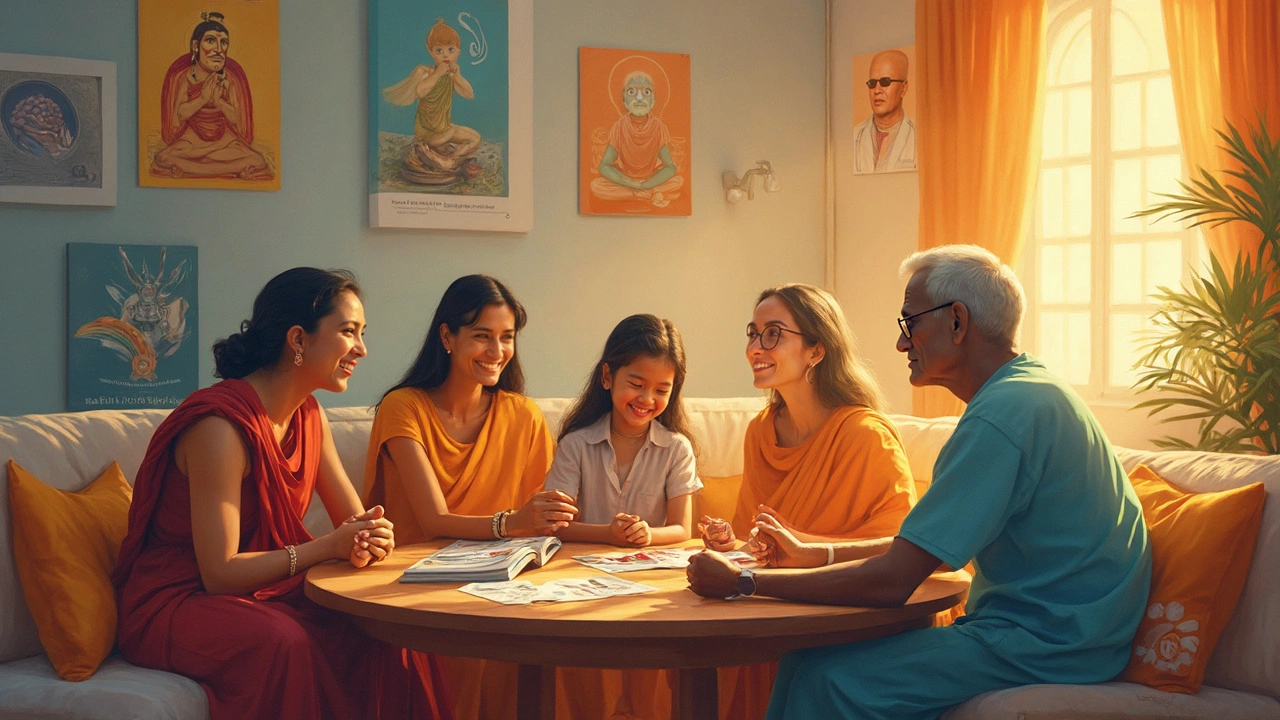The question of whether you can beat cancer 100% is as intriguing as it is complicated. If you're facing this challenge or know someone who is, getting a handle on what's possible in today's world is key. For starters, let's accept that the medical field isn't a magic wand—it's more like a toolbox. You've got chemotherapy, radiation, surgery—tools that are effective but not foolproof.
But guess what? There's hope, and more than just a glimmer. Technology and research are changing the game. Treatments like immunotherapy are like warriors that teach your own immune system to fight cancer cells more aggressively. Sounds like a sci-fi movie, right? Yet, it's real and happening now.
Plus, it's not just about medical treatments. Ever thought about how your lifestyle plays into this? We often ignore it, but good nutrition and regular exercise can boost your immune system. It's like prepping the battlefield for any battle—you need the right kind of ammo.
And let's not overlook the mental side. Staying positive and emotionally healthy is more than just a pep talk. Your mental state can genuinely affect your recovery, supporting your body in fighting the good fight.
- Understanding Cancer
- Standard Treatments
- Emerging Therapies
- Lifestyle Factors
- Emotional and Mental Health
Understanding Cancer
Cancer isn't just one disease; it's more like a sprawling family reunion with lots of different characters, each with their quirk. At its core, cancer is about cells that don't know when to quit. They grow and divide uncontrollably, eventually harming other tissues. It all starts with changes in our genes, small errors that can kickstart this chaotic party.
There are hundreds of types of cancer, and they're not all created equal. Some are more common, like breast and lung cancer, while others are rare but no less serious. Depending on the type, location, and stage, treatments can vary widely. Some cancers grow slowly and might not cause problems for years, while others are quick and aggressive.
To get a bit geekier, let's talk stages. Cancer staging helps understand how far it's spread. Stage I is early, while Stage IV is like, 'Houston, we’ve got a problem!' Treatment choices often hinge heavily on this staging.
Not just treatments, but diagnosis too is a big deal. You might wonder, how do doctors catch it? Through tests like biopsies, MRIs, and CT scans, all aiming to spot those troublesome cells as early as possible.
| Cancer Type | 5-Year Survival Rate |
|---|---|
| Breast Cancer | 90% |
| Prostate Cancer | 98% |
| Lung Cancer | 19% |
So, why do these numbers matter? They give us a snapshot of how treatments and early detection are paying off. That's why regular check-ups and paying attention to unusual body changes can be a lifesaver.
There's a lot of chatter about if you can really beat cancer 100%. While some cases do reach remission—that sweet spot where no traces of cancer can be found—this isn't a ticket to slack off on follow-ups. A healthy lifestyle and continuous monitoring remain partners in keeping it that way.
Standard Treatments
When it comes to tackling cancer, the term "standard treatments" often pops up. These are the tried-and-true methods that have been used for years. We're talking about chemotherapy, radiation, and surgery. Each of these isn't just about blasting away at cancer; there's some serious strategy involved.
Chemotherapy is perhaps the most well-known. It's like sending in troops to wipe out the enemy, except in this case, the enemy is cancer cells. But let's be real; chemo doesn't always play nice with your body. It can wipe out some healthy cells too. The plus side? It's often effective in shrinking tumors or even making them vanish.
Then there's radiation therapy. Think of it as a sniper getting rid of cancer cells specifically. It's highly targeted, so there's less collateral damage to the rest of your body. Pretty cool, right? It's particularly useful for tumors that you just can't cut out.
Surgery is straightforward—if they can cut it out, chances are they're going to. Especially if the tumor is in a spot where it's doing some serious harm. Of course, not all cancers are operable, but when they are, surgery can be a real game-changer.
Standard treatments like these have improved survival rates significantly over the decades. According to data, the five-year survival rate for many types of cancer has seen a marked improvement due to better standard treatments.
Yet, while these treatments are powerful, they're not a guaranteed ticket to beating cancer 100%. That's why docs often mix and match different therapies based on what they think will work best for you.
So, whether you're hearing about these options for the first time or prepping for a treatment plan, remember—you've got some solid methods on your side. It’s all about playing the hand you’re dealt with and making the best possible moves in your personal fight against cancer.

Emerging Therapies
We've all heard the phrase "game-changer" thrown around, but in the world of cancer treatment, some of these emerging therapies really live up to the hype. If you're looking at beating cancer, understanding these newer options can be a big deal.
Let's start with immunotherapy. It's like training your body to fight better. Think of it as teaching a sports team new strategies for a tougher opponent. Immunotherapy helps your immune system recognize and attack cancer cells more effectively. It’s not a one-size-fits-all solution, but for certain cancers like melanoma and some kinds of lung cancer, it's shown promise.
Another buzzword is targeted therapy. This zeroes in on specific targets in cancer cells, kinda like a heat-seeking missile. Unlike traditional chemotherapy that can hit healthy cells too, targeted therapy aims to reduce collateral damage, making it a more precise option.
Then there’s CAR T-cell therapy. Sounds fancy because it is. This involves modifying a patient's T-cells in a lab and then putting them back into the body to hunt down cancer cells. It's been a lifesaver for some with certain types of leukemia and lymphoma.
For those interested in numbers, check out how survival rates have shifted with these therapies:
| Treatment Type | 5-Year Survival Increase |
|---|---|
| Immunotherapy | 15% |
| Targeted Therapy | 10% |
| CAR T-cell Therapy | 20% |
While these numbers are promising, remember that not every treatment works for every type of cancer. So, it’s crucial to have a chat with your oncologist about what fits best for your case. Staying informed and involved is just as important as any medical treatment you might get.
Lifestyle Factors
When it comes to stacking the odds in your favor against cancer, lifestyle changes are like the unsung heroes. It's not just about hitting the gym or eating salads; it's about transforming how you live every day. Small tweaks can actually make a massive difference.
First off, think about your diet. We’re talking about swapping junk for more fruits and veggies. Imagine every meal as an army gearing up to fight, loaded with nutrients that help your body function better. A mix of colorful fruits and greens can provide antioxidants that act like your body's cleanup crew, removing free radicals that could damage cells.
Exercise is another biggie. We're not saying you need to train for a marathon, but regular physical activity, like walking or cycling, can help reduce cancer risk. It boosts your immune system, gives you better blood flow, and helps you maintain a healthy weight. It’s like giving your body a tune-up.
And here's a stat that might surprise you. According to a study, those who exercise regularly have up to a 25% lower risk of certain cancers. Need more incentive? Regular activity can also help manage stress and improve mood, adding a mental health boost to the list of perks.
Let’s not forget about the tricky substances—like tobacco and alcohol. Quitting smoking and keeping your alcohol intake in check can significantly lower your cancer risk. It’s hard, sure, but think of it as one of the strongest tools in your toolbox.
Speaking of stress, maintaining mental wellness is vital. High-stress levels affect your immune system, so keeping calm and relaxed isn't just for yogis. Practices like meditation or deep breathing might sound cliché, but they truly help in keeping both your head and health in check.
It may seem a lot, but remember these changes don't have to happen overnight. Take things one step at a time. Each small decision leaves a mark on your health journey.

Emotional and Mental Health
When you're dealing with cancer, your mental and emotional health can get overlooked, but it's a big part of the puzzle. Feeling anxious or down when confronting cancer is super common. These emotions aren't just a side effect—they're central to the experience. The way you handle this emotional roller-coaster can really influence your journey.
First off, understand that you're not alone. Many people facing cancer go through similar feelings. Finding comfort in talking to others who've been through it can make a world of difference. Consider joining a support group where you can share your fears and victories. It's like having a team backing you up, cheering you on when things get rough.
Another game-changer is mindfulness or even good old psychotherapy. Mindfulness practices, like meditation, can help lower stress levels and improve your overall outlook. Think of it as a mental workout that equips you to manage emotional challenges better.
A few studies show that people who keep a positive outlook often deal with treatment side effects better and may even recover faster. Now, catching some optimism isn't about ignoring the harsh realities. It's about balancing hope with awareness.
Also, small habits can have a big impact. Laugh more, whether through funny shows or hanging out with friends who make you chuckle. It sounds basic, but laughter and humor are like a pressure valve for stress.
If you're wondering about therapy, consider these types:
- Cognitive Behavioral Therapy (CBT): Helps you reframe negative thoughts.
- Art Therapy: Uses creativity as a way to express what's tough to say.
- Supportive Psychotherapy: Offers a space to talk openly about your fears and anxieties.
No need to fight cancer alone—make sure you're tapping into a web of emotional support. It's not just about battling the disease; it's about preserving your quality of life in as many ways as possible.
